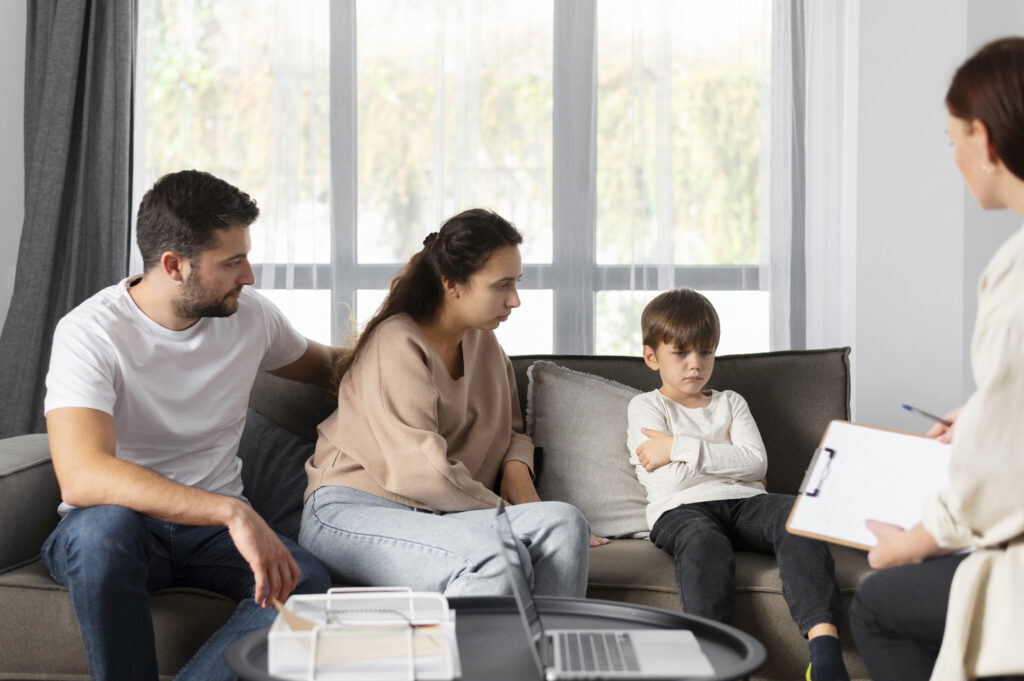Our family is very important to us. Families make people feel loved, cared for, and like they belong. But not every family is great. Bad things can happen in families and cause a lot of pain. What are these tragedies that people talk about? They can change how family members live and talk to each other. A big fight, a breakup, or even a sudden death in the family can cause a lot of stress in the family. Long-term problems like abuse or neglect can also cause stress.
Everyone in a family can be mentally scarred by something terrible that happened a long time ago. These problems can be solved with family trauma treatment. It can also help heal old wounds and bring your family back together. Family trauma therapy has both good and bad points. This blog will talk about how it works and why it might be helpful for families who have been through hard times.
What is Family Trauma Therapy?
Individuals from the same family go to treatment together to talk about traumatic occasions that happened to them as kids and get over the mental torment they caused. Individuals from all or most of the family are included in family treatment, but only one individual is included in individual treatment. To assist the family mend as a whole, we have to be compelled to know how the stress has influenced each individual.
Family treatment like this can help people who have been through hard things like abuse, divorce, or the death of a loved one. It also helps families who have long-term issues like mental health or drug problems that can get worse over time.
Everyone in family trauma care feels safe enough to talk about how they feel and what they think. Part of the therapist’s job is to make sure that everyone is known and heard. The family can trust each other again, get to know each other better, and talk to each other in a healthy way with this process.
Benefits of Family Trauma Therapy
Family trauma therapy offers many benefits for families who are struggling to heal from difficult experiences. Here are some of the key benefits:
Improved Communication
It’s extraordinary that family trauma therapy helps individuals within the same family talk to each other way better. It can be difficult for individuals who have been through a traumatic event to talk almost how they feel since they may closed down or get angry. Family members can say what they need to say without fear of being judged since the specialist empowers open communication. If you learn how to talk to individuals in a sound way, you’ll escape misunderstandings and fights.
Healing Emotional Wounds
Trauma can hurt people emotionally very badly, and the wounds aren’t always clear. When a family goes through trauma care, everyone can talk about how the event hurt them. People in the family can start to heal on their own and as a group by talking about these feelings in therapy.
Building Stronger Relationships
When bad things happen in the family, it can make the bonds between the people living there weaker. There are better ties when people know how to understand, care about, and forgive each other. As family members feel better, they can trust each other more and grow closer.
Learning Coping Skills
Family trauma therapy also teaches important coping skills. Coping skills are techniques that help people manage difficult emotions, stress, and anxiety. These skills can help families handle future challenges in healthier ways. Deep breathing, positive thinking, and problem-solving are all coping skills that are often taught in therapy.
Breaking Negative Patterns
Trauma can sometimes make family members act in bad ways, like fighting all the time or avoiding important talks. Families can see these patterns and work together to change them in therapy. By breaking these bad habits, families can make their homes healthier and more helpful places to be.
Understanding the Impact of Trauma
A lot of the time, people don’t fully understand how a tragedy has changed them until they talk about it in therapy. Family trauma treatment helps everyone understand how the stress has changed how they think, feel, and act. Being able to understand this is the first step toward getting better.
How Does Family Trauma Therapy Work?
Family trauma therapy usually follows a structured process, led by a trained therapist. Here’s how it typically works:
Initial Assessment
To begin with, the specialist should meet with the family to see what’s going on. At this point, the specialist will inquire about the trauma, how it has influenced the family, and what the family needs to induce out of treatment. Also, the advisor will take the time to listen to what each family member has got to say.
Setting Goals
The therapist helps the family set goals for treatment after the first evaluation. Some of these goals could be to improve conversation, settle certain disagreements, or heal emotional wounds. Having clear goals helps the family stay focused on their growth while they are in therapy.
Guided Conversations
During therapy meetings, the therapist will help family members talk to each other. This could mean having family members talk about tough topics, show how they feel, or settle disagreements in a healthy way. During these talks, the therapist makes sure that everyone feels comfortable enough to share their feelings and thoughts.
Learning New Skills
The family therapist will instruct them new skills to assist them deal with their sentiments and make their connections way better whereas they are in treatment. Some of these skills can be ways to communicate, settle differences, or unwind in arrange to feel less stressed and on edge
Ongoing Support
Individual and family trauma therapy usually takes more than one session. This gives the family time to work through their problems and make changes that will last. The therapist provides ongoing support, assisting the family to stay on track and adjust their objectives as required.
Why Family Trauma Therapy is Important?
If you don’t deal with trauma, it can have long-lasting effects on your family. Without therapy, unresolved trauma can cause problems that last for a long time, such as trouble communicating, constant fighting, or mental distance between family members. These problems can affect not only this age but also generations to come because bad habits are passed down.
When someone in your family goes through trauma, it’s important for them to get help. This helps them break the cycle of trauma and start over. Friends and family can make the world a better place for everyone by getting over their problems and getting back together.
Therapy can also help keep mental health problems like anxiety and sadness from happening, which are common after a traumatic event. Therapy can improve the health and happiness of everyone in the family by healing the mental wounds caused by trauma.
Conclusion
There’s a strong way to assist families recuperate from the torment of injury called family trauma therapy. It helps individuals talk to each other way better, builds stronger ties, and gives family members the skills they’ll need to deal with issues in the future. Family treatment gives them a secure place to work through their torment together, even though injury can be difficult to accept.
Families who have been through a big event like a death or a divorce or who are still having problems like fights or addiction can benefit a lot from therapy. By facing the effects of trauma head-on, families can break bad habits, heal mental wounds, and build the strong, caring relationships that every family deserves.


